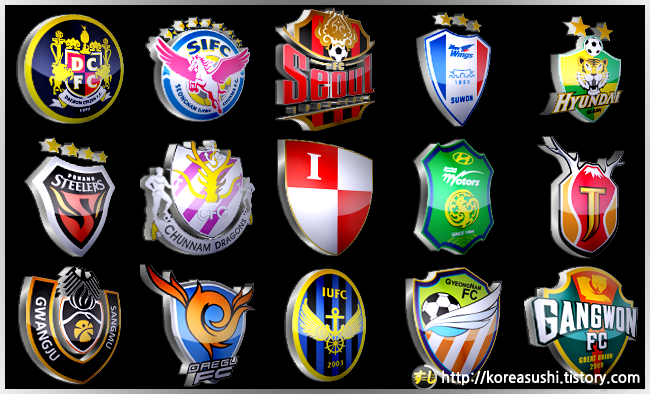Ranking the top 3 Offenses and Defenses (Part 4 and 5)
 |
| (from koreasushi.tistory.com) |
Part IV- Offense in the K-League Classic
K-League Top 3 Teams in Offense and Their League Position
Year
|
Team
|
Goals
|
GF Avg.
|
Pos.
|
2011
|
Jeonbuk
|
67
|
2.23
|
1st
|
Pohang
|
59
|
1.97
|
2nd
| |
Seoul
|
56
|
1.87
|
3rd
| |
2012
|
Jeonbuk
|
82
|
1.86
|
2nd
|
Seoul
|
76
|
1.72
|
1st
| |
Pohang
|
72
|
1.64
|
3rd
| |
2013
|
Pohang
|
63
|
1.66
|
1st
|
Ulsan
|
63
|
1.66
|
2nd
| |
Jeonbuk
|
61
|
1.61
|
3rd
| |
2014
|
Jeonbuk
|
60
|
1.58
|
1st
|
Suwon
|
52
|
1.37
|
2nd
| |
Pohang
|
50
|
1.32
|
4th
| |
2015
|
Suwon
|
60
|
1.58
|
2nd
|
Jeonbuk
|
57
|
1.5
|
1st
| |
Jeju United
|
55
|
1.45
|
6th
|
Obviously goals win championships. The team in the top two in goals has been the champion in two out of the last five years. In the other three, they have been second in the league in scoring. In sum, if you lead the league in goals or are a close second, you will be the champion.
No surprise that Jeonbuk has been in the top three for the last five years. Being the richest team that spends the most money, it is evident that they have got their money's worth. It helps having the leagues best striker (Lee Dong-gook) and one of the best creators (Leonardo).
FC Seoul, since 2012 have struggled offensively. Even though they were not in the top three, Seoul were decent in 2013. Unfortunately, they were terrible in 2014 and a large part of 2015.
I never realized how good of a team Pohang has been these last five years. They were in the top three for four of the last five years. Based on their budget, they really have exceeded expectations. Maybe Hwang Sun-hong, not Choi Hee-kang, has been the best manager for the last five years.
Finally, as the goal average has fallen league wide, it is no surprise that the goal average for the top three teams has also dropped concomitantly as well every year. There was a slight rebound in 2015 and hopefully that will continue next year.
Part V- Defense in the K-League Classic
K-League Top 3 Teams in Defense and Their League Position
Year
|
Team
|
Goals
|
GA Avg.
|
Pos.
|
2011
|
Ulsan
|
29
|
0.97
|
6th
|
Jeonnam
|
29
|
0.97
|
7th
| |
Jeonbuk
|
32
|
1.07
|
1st
| |
2012
|
Incheon
|
40
|
0.91
|
9th
|
Seoul
|
42
|
0.95
|
1st
| |
Pohang
|
47
|
1.07
|
3rd
| |
2013
|
Ulsan
|
37
|
0.97
|
2nd
|
Pohang
|
38
|
1.0
|
1st
| |
Busan
|
41
|
1.08
|
6th
| |
2014
|
Jeonbuk
|
22
|
0.58
|
1st
|
FC Seoul
|
28
|
0.74
|
3rd
| |
Jeju United
|
36
|
0.95
|
5th
| |
2015
|
Pohang
|
32
|
0.97
|
3rd
|
Incheon
|
32
|
0.97
|
8th
| |
Seongnam
|
33
|
0.98
|
5th
|
No surprise, but the last two years have been quite defensive. The top three teams in 2014 and 2015 all conceded less than a goal a game. Compare that with the three years prior when the third place team gave up slightly more than a goal a game.
Jeonbuk conceded a paltry 0.58 goals per game in 2014, which is the best defense of any team in the last five years. Jeju Utd., at 0.95 goals per game conceded, was the third that year. Any other year, including 2012, Jeju would be ranked as the top defense in the league. This is evident why the league only averaged 1.1 goals per game in 2014. It really was the year of defensive play.
The question though is whether or not the quality in defensive play has increased, the quality in offensive play has decreased, or is it something else such as conservative coaching tactics. I would say that it is probably a factor of all three.






![[about]](https://blogger.googleusercontent.com/img/b/R29vZ2xl/AVvXsEh0mXcKy7h0fXIgdvWFm5DpFfwXkPr2ggzUt9_AoPo8vS0HOsFMT8KsO21qTLZBKoLyQXSOAckzy4OtJCPOoHtL5cGqAa0zXKzIdiW45D6TCFAisfJUODssBTfrkat95GXhJc8haWSP3nyV/s1600/KLU.png)
No comments:
Post a Comment